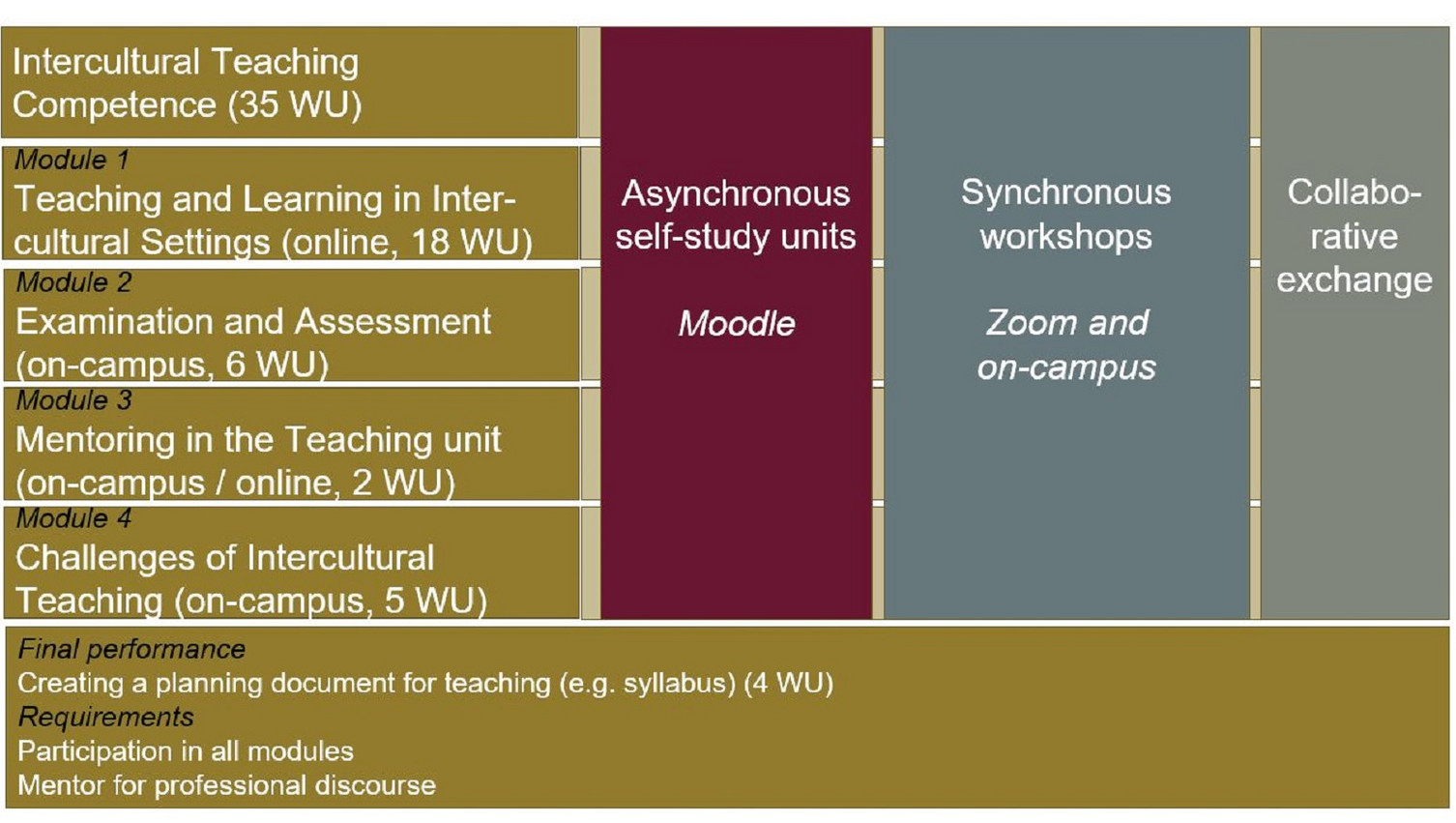Intercultural Teaching Competence
Intercultural Teaching Competence is an English-language continuing education programme in a blended learning format. It is aimed in particular at international lecturers, but also at German-speaking lecturers who teach in English. Participants gain an insight into the basic processes of planning and implementing courses with a focus on learning objectives and the assessment of student performance. A special focus is placed on acting as a teacher in intercultural teaching contexts.
The teaching service will offer the 35 AE blended learning programme starting in November 2025. Synchronous and asynchronous elements are combined in a meaningful way. Knowledge transfer by lecturers is supplemented by extensive opportunities for peer-to-peer dialogue on the challenges of intercultural teaching. In addition, dialogue with an internal mentor about the developed teaching concept is a mandatory part of the programme. In this way, the subject-specific didactic perspective on teaching is taken into account alongside the general didactic perspective and subject-specific peculiarities of teaching organisation are addressed.
- Teaching experience is not essential for participation. However, it is advisable to have a current teaching commitment in order to be able to reflect on and apply the content against the background of your own teaching practice.
- Participation in all modules of the programme is expected in order to obtain the certificate of participation.
- The final assignment consists of creating a draft for the planning of a course (e.g. syllabus). At various points, participants receive feedback on this from other participants, the Module 1 lecturer and a mentor, which they incorporate into the planning document.
The programme is aimed at (international) teachers who teach in intercultural teaching settings and/or in English and are interested in
- a basis for the planning and implementation of teaching as well as for assessment at Leuphana and
- This is particularly important in intercultural contexts.
After successful participation, the participants have
- with fundamental aspects of good intercultural teaching,
- They know planning models and methods that are particularly suitable for intercultural teaching,
- understand the principles of competency-based teaching and assessment an
- can conduct a reflective dialogue about teaching.
Teaching and Learning in Intercultural Settings (18 WU)
The core of the programme is the module "Teaching and Learning in Intercultural Settings". Three consecutive short workshops (14 units) are supplemented by asynchronous self-learning (4 units). The workshops provide an introduction to teaching and learning with a focus on intercultural settings. Participants learn about various learning theories and methods of student-centred teaching, constructive alignment and active learning. The design of intercultural teaching/learning settings is also addressed, including the definition of learning objectives and the planning of teaching and learning activities. The module enables the practical application of the concepts learnt to your own teaching situation and supports the development of intercultural skills for teaching in multicultural groups.
Examination and Assessment (6 WU)
In the "Examination and Assessment" module, participants deal with the basics of competence- and teaching goal-orientated assessment. After a preparatory self-study unit, participants are introduced to a specific assessment grid in the workshop, which they can reflect on and adapt for their teaching.
Mentoring in the Teaching unit (2 WU)
In the "Mentoring in the Teaching unit" module, participants conduct a guided discussion with an experienced teacher about the teaching culture of the subject, teaching organisation and Leuphana-specific features (e.g. subject-specific facilities (FSA)). They are encouraged to discuss the developed planning document with their subject colleague.
Challenges of intercultural teaching (5 WU)
In this module, the participants engage in collegial discourse on the special features of teaching in intercultural settings and work on their own challenges.
Final thesis with feedback and reflection (4 WU)
| Teaching and Learning in intercultural Settings Workshop Part 1 incl. kick-off | 03/11/2025 | 9.30 am -4 pm | on-campus |
| Workshop Part 2 | 10/11/2025 | 9 am -12 am | online |
| Workshop Part 3 | 17/11/2025 | 9 am -12 am | online |
| Workshop Examination and Assessment | 01/12/2025 | 10 am-3 pm | on-campus |
| Workshop Challenges of intercultural Teaching | 12/12/2025 | 9 am-1 pm | on-campus |
| Mentoring in the Teaching unit (Guideline-based interview) | individually | ||
You can register until 20 October 2025 at the following email address: lehrservice.weiterbildung@leuphana.de.
There are 12 places available, which will be allocated in the order in which registrations are received.
Ideally, you will be teaching a course in the 2025/26 winter semester or planning a specific course.
If you have any questions, feedback or concerns, please do not hesitate to contact the Teaching Service team at lehrservice.weiterbildung@leuphana.de.
They will also advise you on how the programme best suits your needs and prior knowledge.
Your contacts at the Teaching Service: Dr. Sigrun Lehnert, Dr. Judith Gurr, Anke Brehl

